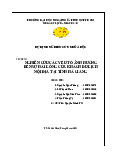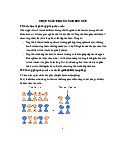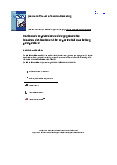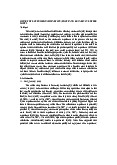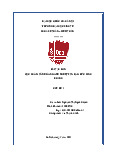



















Preview text:
Businesses that sell goods or merchandies to individual consumers: retailer U8: PRODUCTION
1. What are the main responsibilities of production and quality managers? a) Inventory management b) Employee training c) Financial analysis d) Customer service
2. What is the definition of capacity in the context of production?
Capacity: is the maximum rate of output a) The maximum rate of output
b) The number of employees in a factory c) The cost of raw materials
d) The location of a production facility 2a
3. Which term refers to the geographical situation of a factory?
Location: means geographical situation a) Inventory b) Lead time c) Location d) Component 4. What is a supply chain?
Supply chain: a network of organization
a) The process of outsourcing production
b) The network of organizations involved in production and delivery
c) The inventory management system of a company
d) The maximum rate of output in a factory
5. What does outsourcing mean in the context of industrial production?
a) Buying products or materials from other companies b) Producin g goods internally
c) Reducing the size of a production facility
d) Increasing the inventory levels
6. What are economies of scale?
a) The cost savings arising from large-scale production
b) The disadvantages of large facilities
c) The advantages of having a large inventory
d) The consequences of insufficient capacity 7. What is lead time?
a) The time needed to perform an activity
b) The maximum rate of output in a factory
c) The geographical situation of a factory
d) The process of buying products from other companies
8. What are the advantages of large facilities?
a) Increased flexibility in product scheduling
b) Lower storage and handling costs
c) Protection against variation in raw material delivery time
d) Decreased lead time for customers
9. What are the disadvantages of large facilities?
a) Difficulties in finding enough workers
b) Higher risk of obsolescence and theft
c) Increased costs of storage and handling d) Decreased production volume
10. What are the advantages of having a large inventory?
a) Meeting variation in product demand b) Lowering production costs
c) Decreasing lead time for customers
d) Increasing employee satisfaction
11. What are the disadvantages of having a large inventory?
a) Increased risk of obsolescence and theft
b) Difficulties in finding enough workers
c) Higher storage and handling costs
d) Decreased flexibility in product scheduling
12. According to Thomas Friedman, why are countries involved in a major global
supply chain unlikely to start a war?
a) They prioritize just-in-time deliveries of goods and services
b) They have strong military alliances
c) They have abundant natural resources
d) They want to increase their market share
13. According to Michael Dell, why does the computer industry deserve more praise?
a) It promotes international conflict prevention
b) It generates high profits for companies
c) It provides employment opportunities
d) It supports technological advancements
14. What would be the consequences if a country in a major global supply chain started a war?
a) Disruption of industries and economies worldwide
b) Increase in international trade partnerships
c) Improvement in diplomatic relations
d) Decrease in global production capacity
15. What has been the impact of the evolution of supply chains?
a) Promotion of prosperity and stability in various countries
b) Decrease in international trade partnerships
c) Increase in global production costs
d) Disruption of major industries
16. What does the term "embedded" mean in the context of supply chains?
a) Firmly fixed in something or part of something
b) Temporary connection to a supply chain
c) Negative impact on production processes
d) Lack of flexibility in decision-making
17. What is meant by "standards of living"?
a) The quality of people's lives
b) The financial performance of a company
c) The demand for products in the market
d) The stability of supply chains
18. Who is considered a "founder" in the business world?
a) Someone who establishes a company
b) An employee responsible for quality control
c) A customer who places a large order
d) A government official regulating production processes
19. What is the definition of "risk premium"?
a) The potential cost of taking a chance
b) The financial gain from a successful investment
c) The level of competition in a market
d) The value of a company's stock
20. What does the term "equity" refer to in this context? 20A Equity:
a) The value of a business activity
b) The ownership interest in a company
c) The amount of inventory in stock
d) The rate of production output
21. What does the term "disruptive" mean?
a) Causing trouble and stopping something from continuing as usual
b) Enhancing productivity and efficiency
c) Reducing costs in the production process
d) Increasing customer satisfaction
22. In the context of production, what does the term "exponentially" mean?
a) Increasing or decreasing more and more quickly as time passes
b) Changing at a constant rate over time
c) Remaining stable and consistent over time
d) Decreasing at a steady pace over time 23. What is procurement?
a) The process of selling products to customers
b) The obtaining of supplies or materials
c) The management of production facilities
d) The analysis of financial data
24. What does the term "prosperity" mean?
a) The state of being successful and having a lot of money
b) The decline in economic growth
c) The inefficiency in production processes d) The lack of market demand
25. What does "stability" refer to in the context of production?
a) The situation when something is not likely to change
b) The maximum rate of output in a factory c) The cost of raw materials
d) The geographic location of production facilities
26. Which of the following is not a responsibility of production and quality managers? a) Managing inventory levels
b) Ensuring compliance with quality standards
c) Analyzing financial statements
d) Monitoring production processes 27. Capacity is defined as:
a) The number of employees in a factory b) The maximum rate of output c) The cost of raw materials
d) The location of a production facility
28. What is the advantage of outsourcing in industrial production? a) Lowering production costs
b) Increasing control over the production process
c) Reducing lead time for customers
d) Improving employee satisfaction
29. What are the potential consequences of excess capacity in production? a) Lost sales and market share b) Increased profitability c) Improved product quality d) Expansion into new markets
30. What is the primary objective of a production department? a) Maximizing profits b) Minimizing lead time c) Reducing costs d) Meeting customer demand
31. What is the main purpose of having a large inventory in production?
a) To reduce lead time for customers
b) To lower storage and handling costs
c) To increase flexibility in product scheduling
d) To protect against variation in raw material delivery time
32. What are the potential disadvantages of having a large inventory?
a) Increased risk of obsolescence and theft: nguy cơ lỗi thời
b) Difficulty in finding enough workers
c) Higher storage and handling costs
d) Decreased customer satisfaction
33. According to the Dell Theory of Conflict Prevention, why are countries involved
in a major global supply chain less likely to start a war? x2
a) They prioritize just-in-time deliveries of goods and services
b) They have strong military alliances
c) They want to increase their market share
d) They have abundant natural resources
34. What is the role of procurement in industrial production?
a) Obtaining supplies or materials for production b) Managing inventory levels
c) Analyzing financial statements
d) Monitoring production processes
35. What does the term "embedded" mean in the context of supply chains?
a) Firmly fixed in something or part of something
b) Temporary connection to a supply chain
c) Negative impact on production processes
d) Lack of flexibility in decision-making
36. What is the definition of "standards of living"?
a) The quality of people's lives
b) The financial performance of a company
c) The demand for products in the market
d) The stability of supply chains
37. Who is considered a "founder" in the business world?
a) Someone who establishes a company
b) An employee responsible for quality control
c) A customer who places a large order
d) A government official regulating production processes 38. What is
premium in the context of production and operations the risk management?
a) The potential cost of taking a chance
b) The financial gain from a successful investment
c) The level of competition in a market
d) The value of a company's stock
39. What does the term "equity" refer to in the context of production and operations management?
a) The ownership interest in a company
b) The value of a business activity
c) The amount of inventory in stock
d) The rate of production output
40. What does the term "disruptive" mean in the context of production and operations management?
a) Causing trouble and stopping something from continuing as usual
b) Enhancing productivity and efficiency
c) Reducing costs in the production process
d) Increasing customer satisfaction
41. In the context of production and operations management, what does the term "exponentially" mean?
a) Increasing or decreasing more and more quickly as time passes
b) Changing at a constant rate over time
c) Remaining stable and consistent over time
d) Decreasing at a steady pace over time
42. What is procurement in the context of production and operations management?
a) The process of selling products to customers
b) The obtaining of supplies or materials
c) The management of production facilities
d) The analysis of financial data
43. How is "prosperity" defined in the context of production and operations management?
a) The state of being successful and having a lot of money
b) The decline in economic growth
c) The inefficiency in production processes d) The lack of market demand
44. In the context of production and operations management, what does "stability" refer to?
a) The situation when something is not likely to change
b) The maximum rate of output in a factory c) The cost of raw materials
d) The geographic location of production facilities
45. Which of the following is not a responsibility of production and quality managers? a) Managing inventory levels
b) Ensuring compliance with quality standards
c) Analyzing financial statements
d) Monitoring production processes 46. Capacity is defined as:
a) The number of employees in a factory b) The maximum rate of output c) The cost of raw materials
d) The location of a production facility
47. What is the advantage of outsourcing in industrial production? a) Lowering production costs
b) Increasing control over the production process
c) Reducing lead time for customers
d) Improving employee satisfaction
48. What are the potential consequences of excess capacity in production? a) Lost sales and market share b) Increased profitability c) Improved product quality d) Expansion into new markets
49. What is the primary objective of a production department? a) Maximizing profits b) Minimizing lead time c) Reducing costs d) Meeting customer demand
50. What is the main purpose of having a large inventory in production?
a) To reduce lead time for customers
b) To lower storage and handling costs
c) To increase flexibility in product scheduling
d) To protect against variation in raw material delivery time
51. What are the potential disadvantages of having a large inventory?
a) Increased risk of obsolescence and theft
b) Difficulty in finding enough workers
c) Higher storage and handling costs
d) Decreased customer satisfaction
52. According to the Dell Theory of Conflict Prevention, why are countries involved
in a major global supply chain less likely to start a war?
a) They prioritize just-in-time deliveries of goods and services
b) They have strong military alliances
c) They want to increase their market share
d) They have abundant natural resources
53. What is the role of procurement in industrial production?
a) Obtaining supplies or materials for production b) Managing inventory levels
c) Analyzing financial statements
d) Monitoring production processes
54. What does the term "embedded" mean in the context of supply chains?a
a) Firmly fixed in something or part of something
b) Temporary connection to a supply chain
c) Negative impact on production processes
d) Lack of flexibility in decision-making
55. What is the definition of "standards of living"?a
a) The quality of people's lives
b) The financial performance of a company
c) The demand for products in the market
d) The stability of supply chains
56. Who is considered a "founder" in the business world?a
a) Someone who establishes a company
